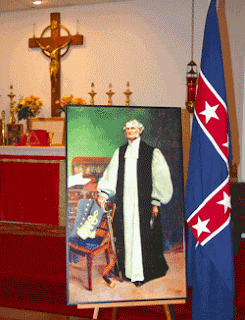
The descendant of Scots-Irish pioneers and the son of a Revolutionary War officer, Leonidas Polk was born in Raleigh, North Carolina in 1806. His grandfather had founded the University of North Carolina and his cousin, James, was destined to become President of the United States. In his teens, Leonidas received an appointment to the U. S. Military Academy at West Point and was commissioned a second lieutenant of cavalry upon graduation in 1827.
As a cadet, Polk was heavily influenced by the Episcopalian chaplain who baptized him and then convinced him to become a priest. The young lieutenant resigned from the army to enter the Virginia Theological Seminary and was ordained in 1831. A year earlier, in 1830, Polk had married Frances Devereux of North Carolina.
The Reverend Mr. Polk served churches in Virginia and Tennessee before being appointed Missionary Bishop of the Southeast in 1838. Three years later, he became the first Episcopal Bishop of Louisiana. Over the next two decades, Leonidas Polk established churches in Thibodaux, Napoleonville, Plaquemine, Donaldsonville, Opelousas, and elsewhere throughout the state. It has been documented that "during his episcopate at New Orleans he ordained sixteen deacons and nineteen priests; and the number of churches grew from three to thirty-three. "
Bishop Polk led the effort to establish the University of the South in Sewanee, Tennessee and he laid the cornerstone there in 1860. He considered the Episcopal school to be "a home for all the arts and sciences and of literary culture in the Southern states. "
The Bishop, like most Southerners, feared that the election of Abraham Lincoln to the presidency in 1860 represented a new era of Federal assaults on the rights of the states of the South. When Louisiana seceded from the Union in January, 1861, Polk put aside his robes and took up the sword to defend his adopted state. President Jefferson Davis appointed him a major general in the new Confederate army and, shortly thereafter, Polk inflicted a defeat upon Union troops under U. S. Grant at Belmont, Missouri. He soon became a corps commander in the legendary Confederate Army of Tennessee and fought in scores of major and minor battles. Always remembering his Christian duties and the demands of his faith, the "Fighting Bishop" was largely responsible for the great spiritual revival which swept the Confederate forces .
In the spring and summer of 1864, General Polk assisted in the defense of Atlanta against William T. Sherman's marauding Northern army . On June 14, at Pine Mountain, he was killed by Union artillery fire. According to Private Sam Watkins of the 1st Tennessee Infantry,
"hundreds of Confederate soldiers shed tears when told of the Bishop's death. "
Leonidas Polk of Louisiana would later be described as a man who "in pulpit and on battlefield, lived up to the tradition of a family that offered itself again and again upon the altar of freedom. It was his idea that a man should fight for what he believed...his was a fighting faith."
(http://www.knowsouthernhistory.net/Biographies/Leonidas_Polk/)